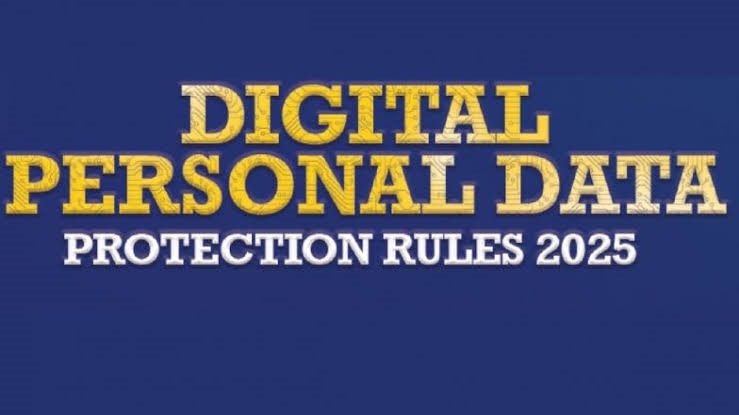Secure, Inclusive, Innovative Digital India
Syllabus:
GS 3:
- Digital India
- Issues related to Cyber security and digital Awareness.
Why in the News?
The Government of India has introduced the Draft Digital Personal Data Protection (DPDP) Rules, 2025 to operationalize the Digital Personal Data Protection Act, 2023. These rules aim to empower citizens, ensure data privacy, and promote inclusivity in India’s growing digital ecosystem.
Empowering Citizens Through Data Protection
- Informed consent: Citizens are given the right to provide clear and explicit consent before their data is collected or processed, ensuring transparency and control.
- Data erasure rights: Individuals can request the removal of their personal data, providing them greater authority over their digital footprint.
- Appointment of digital nominees: Citizens can designate nominees to manage their digital assets and identities, ensuring continued protection and accessibility.
- Multilingual accessibility: Provisions ensure that information is available in English and 22 regional languages, fostering inclusivity and ease of understanding.
- Protection from breaches: Citizens gain access to tools and mechanisms for addressing unauthorized data usage, promoting accountability among data processors.
Safeguarding Children in the Digital Age
- Parental consent: Verifiable parental or guardian consent is mandatory for the processing of minors’ personal data, protecting children’s digital rights.
- Prevention of profiling: Measures are in place to shield children from unauthorized profiling and exploitation by digital platforms or advertisers.
- Restrictions on harmful content: Provisions aim to create a safer digital environment by mitigating children’s exposure to inappropriate or harmful content.
- Age verification systems: Platforms are encouraged to implement age verification mechanisms to ensure compliance with rules governing children’s data.
- Focus on child safety: Dedicated safeguards are designed to address the unique vulnerabilities children face in an increasingly data-driven world.
Balancing Innovation and Regulation
- Pragmatic regulatory approach: The framework prioritizes a growth-oriented model, balancing the need for innovation with robust data protection.
- Compliance burden reduction: Small businesses and startups face reduced obligations, promoting their growth while ensuring basic data safety standards.
- Graded responsibilities: Larger entities with higher data handling capacities are subject to stricter accountability measures, ensuring fair implementation.
- Support for digital innovation: Policies are crafted to maintain India’s status as a global leader in the digital economy, enabling technological advancements.
- Global alignment: The framework incorporates best practices from global models while adapting them to India’s unique socio-economic conditions.
Digital-First Governance Philosophy
- Efficient grievance redressal: The Data Protection Board operates digitally to handle complaints swiftly, ensuring transparency and speed.
- Streamlined consent mechanisms: Digital workflows simplify the process for both citizens and fiduciaries, enhancing compliance and trust.
- Minimized physical interactions: A fully digital approach reduces the need for physical submissions, making the system more accessible and user-friendly.
- Automated compliance checks: The framework uses technology-driven solutions to ensure fiduciaries adhere to rules effectively and efficiently.
- Enhanced accountability: Technology integration promotes real-time monitoring of data-related activities, ensuring adherence to privacy norms.
Inclusive Policy Formulation
- Participatory approach: Feedback from citizens, businesses, and civil society during public consultation reflects a commitment to inclusivity in decision-making.
- Adaptation to local needs: The rules address India’s diverse socio-economic landscape, ensuring relevance and applicability across demographics.
- Global benchmarking: Incorporates international standards while adapting them to India’s unique cultural and economic context.
- Widespread public awareness: Initiatives are planned to educate citizens about their rights and responsibilities, ensuring effective implementation.
- Stakeholder engagement: Collaborative inputs from all sectors help create a framework that is practical, robust, and future-ready.
Challenges in Implementation
- Public awareness deficit: Many citizens may not fully understand their data rights and responsibilities, leading to underutilization of the framework.
- Capacity building for startups: Small businesses might struggle with implementing technical and regulatory requirements, requiring additional support.
- Regulatory oversight limitations: Ensuring compliance across a diverse and rapidly growing digital ecosystem could overwhelm regulatory authorities.
- Balancing innovation and privacy: Maintaining a growth-oriented model while upholding stringent data protection norms can be challenging.
- Technological barriers: Limited access to advanced technological infrastructure in smaller towns and rural areas may hinder effective implementation.
Way Forward
- Enhanced public awareness campaigns: Launch large-scale initiatives to educate citizens about their rights and responsibilities under the new framework.
- Support for smaller entities: Provide financial and technical assistance to startups and small businesses for compliance.
- Strengthened regulatory framework: Equip the Data Protection Board with adequate resources to handle grievances efficiently and fairly.
- Periodic review mechanisms: Regularly update the rules to address technological advancements and emerging privacy challenges.
- Foster international collaboration: Share India’s approach as a model for global data governance while learning from international best practices.
Conclusion
The Draft DPDP Rules, 2025, mark a transformative step in India’s digital journey. By empowering citizens, safeguarding privacy, and fostering innovation, these rules create a framework for a secure, inclusive, and thriving Digital India.
Source: Hindustan Times
Mains Practice Question
Discuss the significance of the Draft Digital Personal Data Protection Rules, 2025 in shaping a secure and inclusive digital future. Examine the challenges of implementation and suggest measures to ensure widespread compliance and public awareness.




